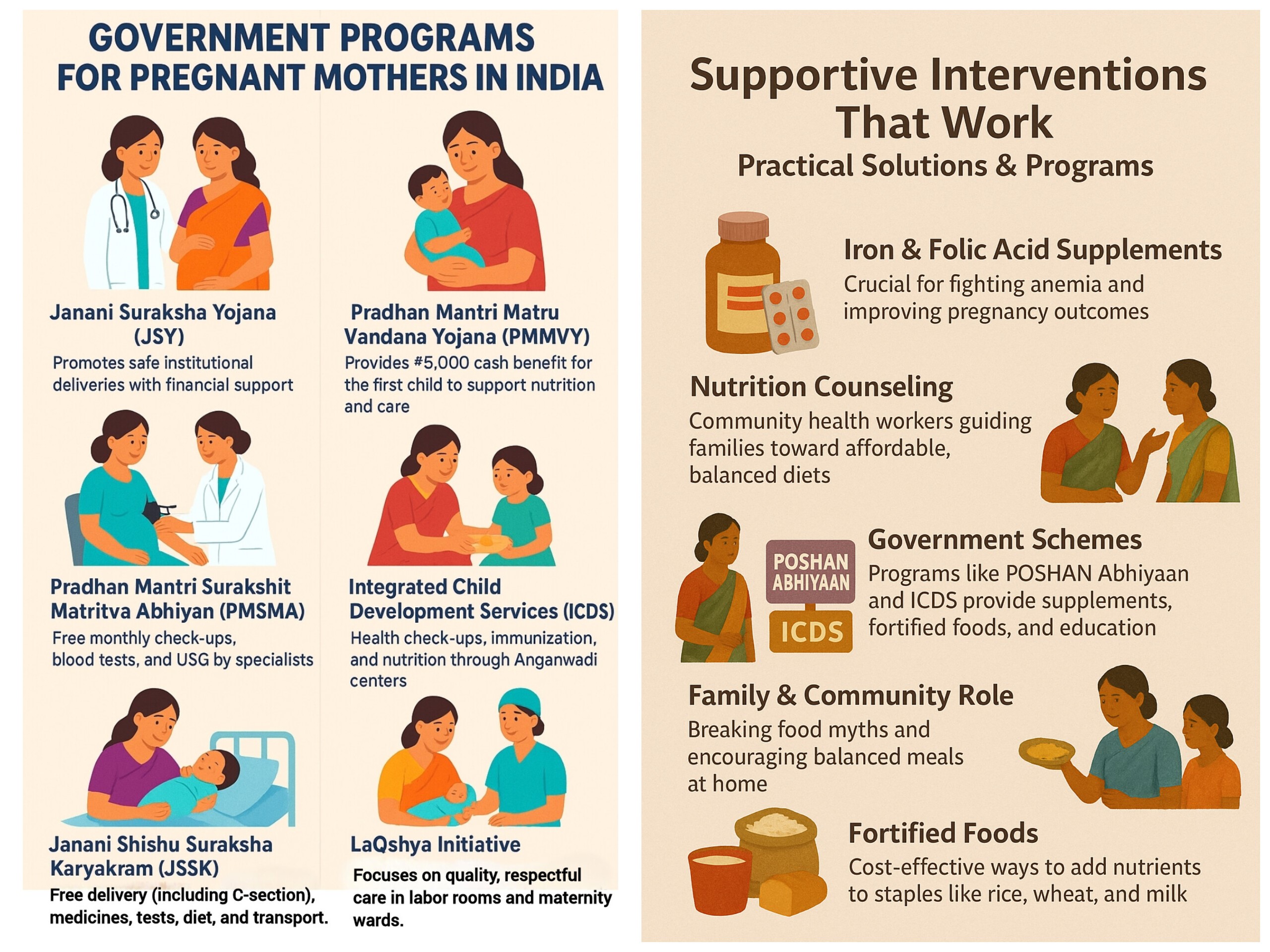By Nutriworld | Dt. Dipanwita Saha
Have you ever wondered how much power lies on a mother’s plate? In India, maternal nutrition is more than just food—it’s the foundation of a nation’s health. When expectant mothers lack proper nourishment, it affects not only their well-being but also their child’s future. With awareness, support, and access to the right foods, we can spark a silent revolution for healthier generations.
The Reality of Maternal Nutrition in India:
India has advanced in healthcare, yet maternal nutrition remains a pressing concern. NFHS-5 reports that over 50% of women of reproductive age are anemic, and many pregnant women lack essential nutrients like iron, folic acid, and protein. Poverty, limited healthcare, and cultural myths around pregnancy diets worsen the issue, leading to weak mothers, low birth weight babies, and long-term health challenges.

What Mothers Face Everyday – Barriers to proper nutrition
- Lack of Access to Nutrients – Rural and low-income families often struggle to afford or find nutrient-rich foods.
- Food Taboos & Myths – Many still believe pregnant women should avoid certain foods like eggs or papaya, limiting vital nutrients.
- Financial Barriers – Healthy meals feel “expensive” compared to filling but less nutritious options.
- Awareness Gaps – Many women are unaware of the importance of balanced prenatal nutrition.
- Weak Healthcare Support – Missed counseling and irregular check-ups leave mothers without guidance.
The Ripple Effect Across Generations :
Maternal nutrition isn’t just a pregnancy concern—it shapes the future of families and nations. Babies of undernourished mothers face weak immunity, poor growth, and higher risks of diseases later in life. For mothers, it means fatigue, slow recovery, and serious pregnancy complications. On a larger scale, poor maternal health lowers productivity, increases healthcare costs, and holds back national progress. When mothers are nourished, generations thrive; when they suffer, everyone pays the price.
Why maternal nutrition is a national investment
Health experts agree: maternal nutrition is one of the smartest investments India can make. UNICEF notes that every rupee spent on maternal and child nutrition can return up to 16 times in economic benefits. A healthy mother creates a healthier child, who grows into a stronger, more productive adult. Improving maternal diets is not charity—it’s an investment in India’s future workforce and well-being.
Supportive Interventions That Works: Practical Solutions & Programs
- Iron & Folic Acid Supplements – Crucial for fighting anemia and improving pregnancy outcomes.
- Nutrition Counseling – Community health workers guiding families toward affordable, balanced diets.
- Government Schemes – Programs like POSHAN Abhiyaan and ICDS provide supplements, fortified foods, and education.
- Family & Community Role – Breaking food myths and encouraging balanced meals at home.
- Fortified Foods – Cost-effective ways to add nutrients to staples like rice, wheat, and milk.
These interventions are paving the way for healthier mothers and stronger children.

Conclusion – A Call for Collective Action
Maternal nutrition is not just a personal choice—it is the foundation of national progress. By breaking harmful food myths, ensuring access to supplements, and strengthening awareness through supportive programs, India can overcome this silent crisis. A well-nourished mother gives birth to a healthier baby, nurtures stronger generations, and builds a brighter future for the nation. Every meal, every supplement, and every act of support is more than nourishment—it is a step toward a healthier generation and a stronger India.
“Nourish a Mother, Nurture a Generation”
FAQs
1. Why is maternal nutrition so important?
It protects both mother and baby, ensuring healthy growth, safe childbirth, and lifelong immunity for both.
2. Which nutrients are most crucial during pregnancy?
Iron, folic acid, calcium, protein, and vitamins A, C, and D.
3. How does poor nutrition affect children later in life?
It increases risks of stunting, weak immunity, and chronic diseases like diabetes.
4. What simple steps can families take?
Encourage balanced meals with local foods, support supplements, and break harmful food myths.
5. Are government programs making a difference?
Yes. Initiatives like POSHAN Abhiyaan and ICDS provide fortified foods, supplements, and nutrition education.

